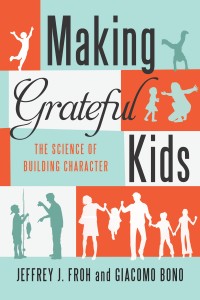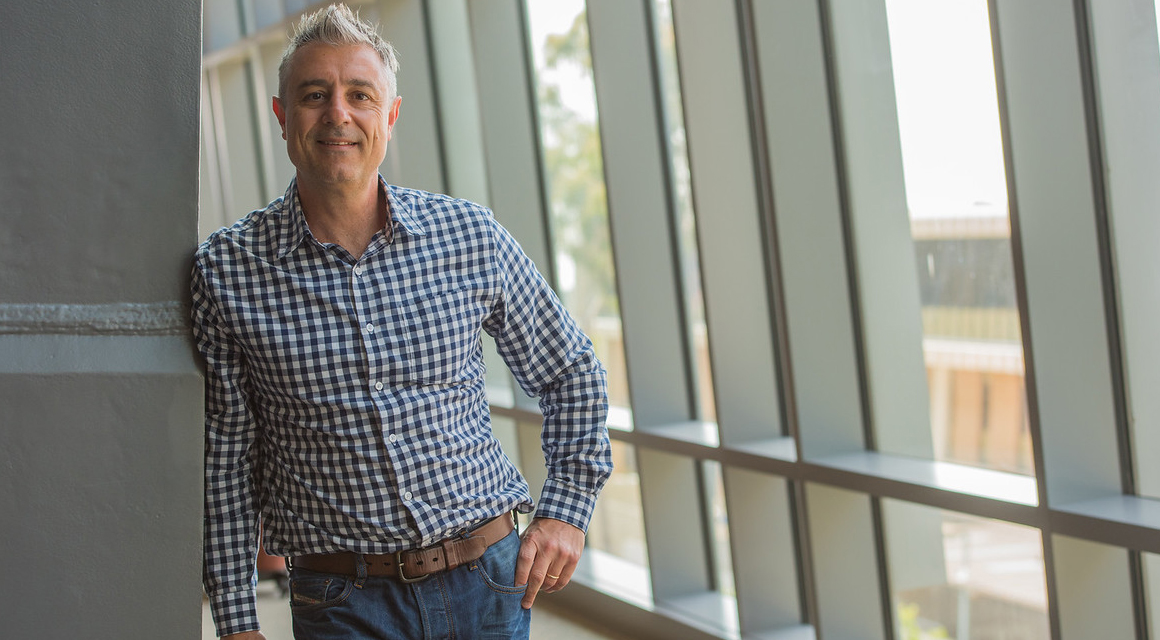This article originally appeared in the Fall 2019 issue of CSUDH Magazine.
Gratitude is a familiar concept, but one that can be hard to specifically pin down, says Giacomo Bono. “Just like well-being or success, how do you define it?”
“Sometimes I joke that gratitude is the most underappreciated value. People value it, but it’s really a question of how you practice it. Even thought it seems like a simple behavior, the more you look at it, and the more you genuinely try to live up to it and practice it, the more meaningful your life gets.”
Bono, an assistant professor of psychology at CSUDH and co-author of the book Making Grateful Kids: The Science of Building Character, has spent years teaching and conducting research focused on gratitude, its development, and how to encourage it throughout society.
Bono’s research suggests that it is important to express gratitude whenever it is felt, no matter what you’re feeling grateful for. “It could be people or things, it could be how your life has turned out; it could be God. It could be nature, it could be a relationship you are grateful for, a friendship, or a relative.”
 Bono is most interested in interpersonal, or in-person, expressions of gratitude, and emphasizes the importance of being sincere. “We’ve learned to thank each other since we were toddlers– but we often do it automatically and pointlessly, as a politeness, when we say ‘please’ and ‘thank you,'” he says.
Bono is most interested in interpersonal, or in-person, expressions of gratitude, and emphasizes the importance of being sincere. “We’ve learned to thank each other since we were toddlers– but we often do it automatically and pointlessly, as a politeness, when we say ‘please’ and ‘thank you,'” he says.
“We don’t really get specific and think about the meaning behind a gift or help from someone. But, like mindfulness and meditation, if you don’t practice gratitude genuinely, then it just doesn’t work.”
Whatever it is that you are grateful for, in order to make the experience valuable in your day-to-day life, it is important that your gratitude be realized, noted, or expressed, says Bono. Gratitude can only become a defining character strength through conscious practice, by frequently recognizing the individuals and occurrences that we are grateful for.
Studies, including Bono’s research, suggest that expressing gratitude improves the well-being of both those who offer thanks and the recipients of appreciation. “There’s potency in practicing gratitude inter-personally– sharing our thanks with others,” he says.
Research also suggests, however, that people wanting to share sentiments of gratitude may shy away from doing so due to fear of embarrassment, both for themselves and others. “We underestimate how much it matters and how surprising receiving thanks will be, and we overestimate how awkward it will be to thank others. These biases can prevent us from actually thanking someone,” he says.
“The truth is that this kind of disclosure is what starts friendships.”
Bono’s recent scholarly research includes the article “A New Approach to Gratitude Interventions in High Schools that Support Student Wellness,” which will be published in The Journal of Positive Psychology this fall. Bono is also developing and testing a school curriculum for middle and high schools that emphasizes the best gratitude practices for young people. In addition, he’s been instrumental in creating a modern intervention for schools using the app by GiveThx.org, a journaling and social interaction platform that allows for private exchanges of gratitude among its users. Students and teachers can use the app to send private appreciative notes to one another without the scrutiny or potential embarrassment of public social media posts.
Early application of both programs has proven successful so far, according to Bono. “Some of the basic findings are that using the app along with the curriculum reduces depression, social anxiety, and perceived stress,” he says. “Students also reported increases in their satisfaction with their friendships.”
Whether digital or in-person, everyone’s technique is different, says Bono. “My gratitude practices personally are often leaving thank you notes and verbal thank yous and acknowledgement. If you feel comfortable saying ‘blessed,’ then go for it. Use ‘appreciation,’ or say ‘what a wonderful gift.’ It can be a hug, making eye contact, touching someone’s shoulder, a handshake, or a high-five– all that stuff is meaningful, too.”
Bono says that of all the character strengths related to happiness and well-being, gratitude is among the most important. “It’s one of the biggest character strengths– and the most malleable. You can change it, and you can grow it. What gratitude does is connect us to something bigger and more benevolent, something positive in the universe. I think that is important to humans in general.”
